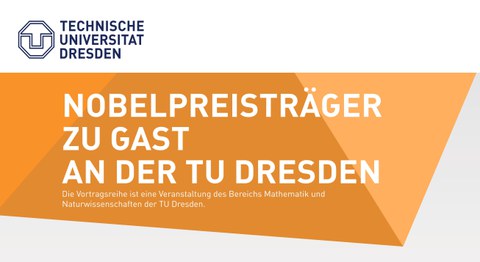Apr 05, 2017
When TUD’s Audimax turns into the Aula Magna…
…then it is time for the sequel of last year’s public lecture series “Nobelpreisträger zu Gast an der TU Dresden” (“Nobel Laureates at TU Dresden”). Starting at the end of April, four Nobel Laureates will come to TU Dresden bringing the Nobel spirit to Dresden and turning the Audimax into the famous Aula Magna in Stockholm.
Clone pioneer, mismatch researcher, master of flies and ghost-particle hunter – four outstanding and distinguished scientists, among them one woman, will give a public talk at TU Dresden and share with us the sensation of being honoured with one of the world’s most famous prizes.
The British knight and clone pioneer Sir John B. Gurdon holds the kick-off lecture on 26 April 2017. The developmental biologist was awarded the 2012 Nobel Prize in Physiology or Medicine "for the discovery that mature cells can be reprogrammed to become pluripotent.”– a pioneering work in the field of cloning and stem cell research. His talk will be titled “Somatic cell nuclear transfer: memory of the past versus hope for the future.”
The US-American biochemist Paul Modrich comes to TU Dresden on 16 May. He was awarded the 2015 Nobel Prize in Chemistry "for mechanistic studies of DNA repair." Paul Modrich is a perfect example of proving that it is worth following your goals. Over decades, he pursued the idea of decoding the repair mechanism in the DNA code. Finally, he succeeded and identified the mismatch repair system (MMR) in cells. In his talk „Mechanisms in DNA mismatch repair“, he will explain the underlying cell mechanisms to Dresden’s public.
The Frankfurter Allgemeine Zeitung named her „Master of Flies“: Christiane Nüsslein-Volhard. The German developmental biologist and geneticist won the 1995 Nobel Prize in Physiology or Medicine for the discovery concerning the genetic control of early embryonic development. Christiane Nüsslein-Volhard studied mutants of the fruit fly (Drosophila melanogaster) and identified the genes in the egg of the fly that direct the cells to form a new fly. In her later work, Christiane Nüsslein-Volhard preferred the zebrafish as her object of study. In her talk (in German) at TU Dresden on 7 July 2017, she will answer the question „Die Streifen des Zebrafisches: Wozu und wie entsteht Schönheit bei Tieren?“ (The colour pattern of Zebrafish: towards an understanding of the evolution of beauty).
Arthur McDonald takes us to the underground on 28 June 2017. In his talk “A Deeper Understanding of our Universe from 2 km Underground”, the Canadian particle researcher will talk about his work at the Sudbury Neutrino Observatory (SNO). In 2001, McDonald and his team were able to prove that neutrinos – often known as ghost-particles – have mass. For more than 15 years, TU Dresden’s Prof. Kai Zuber has been part of the SNO team which succeeded in a breakthrough in neutrino research and in our understanding of the universe. Arthur McDonald therefore was awarded the 2015 Nobel Prize in Physics.
Here at TU Dresden, many of our researchers also dream of making a break-through discovery and winning the Nobel Prize one day. Even though this will remain a dream for the majority, the Nobel lecture talks will certainly convey inspiration and motivation for a fulfilled scientific career. Additionally, interested junior scientists will get the opportunity to discuss their individual projects with the Nobel laureates in small discussion rounds.
Our public talks are open to everyone. Each talk starts in the Audimax, Hörsaalzentrum TU Dresden at 7pm. We kindly ask for your registration at tu-dresden.de/mn/nobel
The lecture series is an event of the School of Science and is supported by the companies Novaled, Molecular Diagnostics Group, KBA-Sheetfed Solutions AG & Co. KG, Heel, the Hotel Taschenbergpalais Kempinski and the Association of Friends and Sponsors of TU Dresden.
Media inquiries:
Prof. Clemens Kirschbaum
Tel.: +49 (0) 351 463-37512

